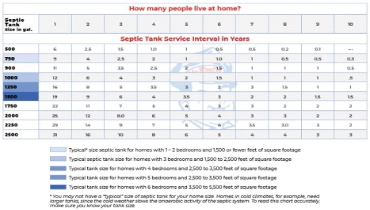
In an ideal world, your septic tank operates out of sight and out of mind. Most of the time, that’s exactly how things work, but the unobtrusive nature of a septic tank can make it easy to forget about. However, forgetting about yours isn’t a great idea. Regular septic tank pumping is essential to their effective operation.
If you need your septic tank pumped, call the experts at Mr. Rooter® Plumbing. Regular maintenance and pumping from professionals will help you avoid smelly and expensive septic tank or drain field repairs. If they are regularly pumped, septic tanks can last decades and provide reliable sewage treatment.
How Often Should a Septic Tank Be Pumped?
How often a septic tank needs to be pumped depends on several variables. The size of your family, tank size, whether you have a garburator, and climate are a few factors that will influence the service interval. Use the chart a few sections down to find out how often you should pump your septic tank.
How Do I Know My Septic Tank is Full?
Hopefully, you’re aware that your septic tank is getting full before your yard is flooded with sewage. If you notice the drains in your home backing up, this is a good indicator the septic tank needs to be pumped.
Foul odors, sewage smells, or standing water outside your home can also indicate septic tank failure. Clogged pipes or sewer blockages can sometimes be septic tank problems, but may also have other causes. It’s best to get a professional diagnosis if you’re experiencing either of these issues.
If none of these symptoms are present, locate your septic tank access port. Put on gloves, protective clothing, and eyewear for safety, and then insert a 15 - 25 cm wooden rod vertically into the septic tank. If the sludge is more than one-third full, it’s time for a pump.
Septic Tank Pump Chart
Use the chart below to find the correct service interval for your septic tank. Remember: This chart is a guide and not a failsafe. Some provinces, cities, or towns may have minimum septic tank requirements regardless of your home size.


What Variables Affect Septic Tank Service Intervals?
The service intervals above are recommendations, not hard and fast rules. There are many variables that affect how often you should pump your septic tank, such as:
- How often do you run your garburator
- Running a business out of your house
- Frequent disposal of coffee grounds or other non-septic-friendly materials in the drain
- Hosting events at your home
- Having a sewage ejector pump connected to your septic system
- Using a water softener that is connected to the septic tank
- Doing more laundry than the average person or family
Professional Septic Tank Pumping
Septic tank pumping is not your typical DIY project, it requires the help of a professional. If you want to help cut down the required service time, you can locate the septic tank access port and dig it out if it’s buried. Sometimes this can be a treasure hunt! Just call or request an appointment online with our service professionals.

